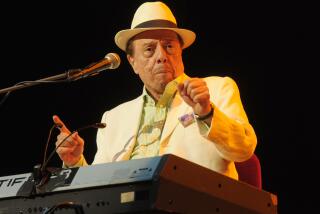JAZZ REVIEW : Mixed Results at Brazilian Night at Bowl
- Share via
It was just past 10 p.m. before headliner Sergio Mendes and Brasil ’99 finally reached the Hollywood Bowl stage Wednesday night for a program of Brazilian music, their arrival stalled by seemingly interminable production delays. Inevitably, audience departures began before the end of Mendes’ truncated set.
Were the 1960s pop-bossa hit-maker and his current ensemble worth the wait?
Yes and no. Yes, when he brought his four-member percussion team forward for an entertaining display of the timbres and rhythms of Brazilian music included on his new recording, “Brasileiro.” And, yes, on the very infrequent instances when he performed early hits such as “Mas Que Nada.”
But when Mendes added singer Joe Pizzulo for a couple of eminently forgettable numbers, the Brazilian magic disintegrated, replaced by the too-transparent commercial goals of pop balladry.
Milton Nascimento, in his second Southland appearance of the summer, sounded surprisingly complacent. Only occasionally did he generate the mixture of activism, sensuality and sheer panache that is so intrinsic to his music. There were a few other attractive moments: a contrapuntally harmonized group vocal, some gorgeous blendings of accordion and synthesizer, and Nascimento’s characteristically bittersweet sound. As with Mendes, however, this was not always Nascimento at his very best.
Singer Leny Andrade, a last-minute substitution for Gal Costa, was also uneven. Her too-slow reading of “Dindi” revealed glaring weaknesses in her effort to revive the Sarah Vaughan style. But her up-tempo scatting--especially on “Night in Tunisia”--clearly justified her growing reputation as one of the finest vocal jazz improvisers in the world.
Guitarist Oscar Castro-Neves, who accompanied Andrade, had the unenviable job of opening the show. Ironically, his music was at times more appealing than that of the better-known artists. Filled with bright melodies, high-flying jazz lines and impeccable guitar work, Castro-Neves’ tunes brilliantly merged the spirit of jazz improvisation with the soul of Brazilian rhythm.
More to Read
The biggest entertainment stories
Get our big stories about Hollywood, film, television, music, arts, culture and more right in your inbox as soon as they publish.
You may occasionally receive promotional content from the Los Angeles Times.










